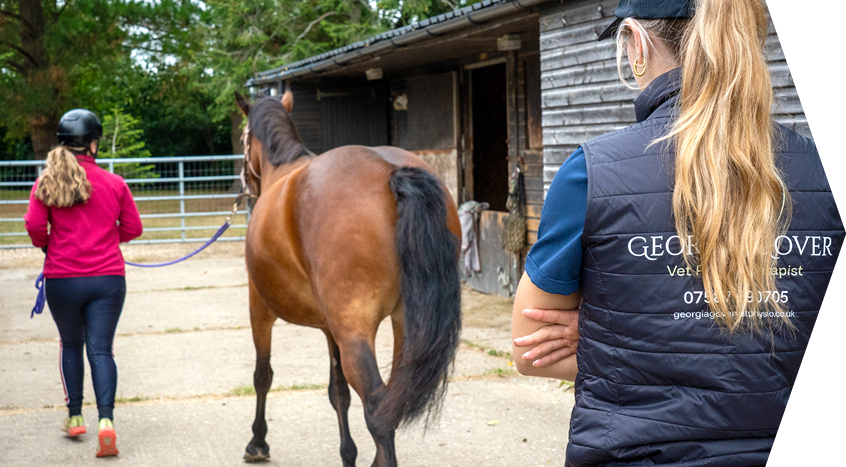Please ensure your animal is clean, dry, and in a calm environment where they can relax. A quiet, flat area is ideal for assessment and treatment. You’ll also need to be present to help handle your animal and walk them up for movement assessments. If your pet is recovering from a specific medical condition or injury, a veterinary referral is required before starting treatment, as per legal regulations. This is not needed for general maintenance cases or performance support.
Initial consultation and history:
The first session includes a full consultation. I’ll gather information about your animal’s age, breed, routine, and any current concerns. We’ll discuss relevant medical history, past injuries, surgeries, and medications. With your permission, I may contact your vet to access clinical records to ensure the safest and most informed treatment plan.

Physical assessment
A detailed assessment helps guide the treatment approach:
- Observation at Rest: I’ll assess your animal’s posture, conformation, muscle symmetry, weight-bearing, and stance while they’re standing.
- Movement Assessment: I’ll observe them walking and trotting (or moving in appropriate gaits) to assess gait quality, joint movement, stride length, and any subtle imbalances.
- Palpation & Mobility Checks: I’ll gently feel for areas of muscle tension, discomfort, or restriction and assess how joints move through their range of motion.
This structured approach helps me to localise causes of discomfort or dysfunction and tailor treatment appropriately
Hands-on massage techniques are used to improve circulation, release muscle tension, and reduce discomfort
Targeted passive stretches help lengthen and relax muscles, improving mobility and comfort – particularly helpful for animals with restricted movement or reduced flexibility from injury or post surgery.
ROM involves gently moving joints through their normal range of motion to support healthy movement patterns – especially useful during recovery or after periods of reduced activity.
Laser uses both infra-red and red light to stimulate the body’s natural healing processes. The light penetrates the skin and is absorbed by cells, boosting ATP production, increasing circulation and accelerating tissue healing.
NMES stimulates muscles through electrical pulses to promote strength, particularly useful during rehabilitation or after prolonged periods of reduced activity.
The application of gentle heat helps improve circulation, ease discomfort, and prepare tissues for stretching or massage.
Used post-exercise or after injury, cold therapy helps reduce inflammation and pain by slowing blood flow and nerve activity in the affected area.
Following treatment, your pet may benefit from a period of rest or light activity. I’ll provide personalised advice and, where appropriate, recommend a home care or rehabilitation plan to support ongoing progress. You’re always welcome to contact me with questions between sessions.